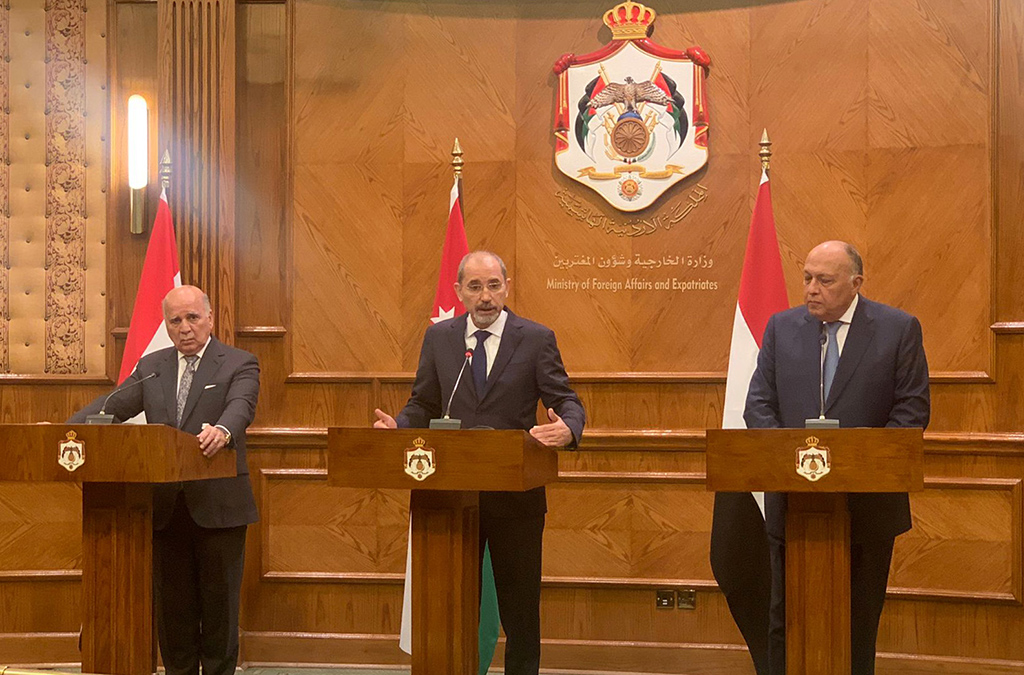AMMAN: Jordan, Egypt and Iraq stressed on Wednesday, the importance of the Baghdad Conference, second edition of which is due to be held in Amman, to support Iraq's efforts in maintaining its stability, security, territorial integrity, and fighting "terrorist" organizations'. This came in a statement issued after a joint meeting by the foreign ministers of Jordan, Egypt, and Iraq on ways to enhance cooperation among the three countries in the fields of trade, industry, transportation and energy.
Iraqi Foreign Minister Fouad Hussein said that Baghdad conference will be held primarily to affirm the continuous support by the participating countries of Iraq's sovereignty In this context, Hussein predicted the participation of Turkey and Iran in the second edition of the conference, stressing his country's refusal to "allow any organization to use Iraqi lands to attack neighboring countries or allow these countries to attack its lands."
Other issues were discussed during the meeting, Hussain said, including the joint economic projects, and the upcoming Arab-Chinese summit, stressing the importance of the cooperation mechanism "to create balanced relations with neighboring countries and strengthen relations with these countries." For his part, Egyptian Foreign Minister Sameh Shoukry said that the next conference is devoted to supporting Iraq to restore its stability, policy, and territorial integrity, and overcome the effects of the war launched by "terrorist" organizations.
Shoukry noted that Egypt supports what Iraq's achievement in the field of the political process as being a major component of joint Arab action and a factor of stability for the region. On his part, Jordanian Foreign Minister Ayman Safadi said that work is underway to prepare for hosting the second edition of the (Baghdad Conference), is due to held in the Jordanian capital Amman on December 20.
The conference will be held in light of the political and economic challenges facing the region and the world, " we are working through the mechanism of a trio cooperation to ease its impact on our countries", Safadi noted. According to official Jordanian data, the tripartite cooperation mechanism between Jordan, Egypt and Iraq aims to increase cooperation between the three countries in the sectors of trade, industry, economy, road transport, electrical connection and energy.
The last tripartite summit at the level of leaders was held in June 2021 in the Iraqi capital, Baghdad, and was preceded by two summits in 2020 and 2019, while the foreign ministers of the three countries held a series of meetings within the framework of the mechanism, the last of which was on the second of last November.
Sites protection plan
In another development, the United Nations Under-Secretary-General Miguel Angel Moratinos discussed in a meeting with the religious authority Ali Al-Sistani, held on Wednesday in Najaf, Iraq, the action plan UN intends to adopt to protect religious sites worldwide after the attacks that targeted many of them recently. Moratinos, who was assigned by the UN to set up the plan, gave Al-Sistani an extended explanation of the principles of the plan and required procedures on that matter, Al-Sistani's office said in a statement today.
The statement quoted Al-Sistani as stressing the importance of exerting all possible efforts in promoting culture of peaceful coexistence, abandoning violence and hatred, and establishing the values of harmony based on mutual respect among believers of different religions and intellectual approaches. He criticized what he described as intellectual and religious oppression, the suppression of freedoms, and the absence of social justice, which led to the emergence of some extremist movements. Al-Sistani expressed his appreciation for the efforts the UN exerts in confronting such phenomena.
From her side, the Special Representative of the Secretary-General for the United Nations Assistance Mission for Iraq, Jenin Plasschaert, said in a press conference after attending the meeting that Al-Sistani's message is to support peaceful coexistence between various components in Iraq and abroad. She called on the political leaders there to adopt the same approach. - KUNA










